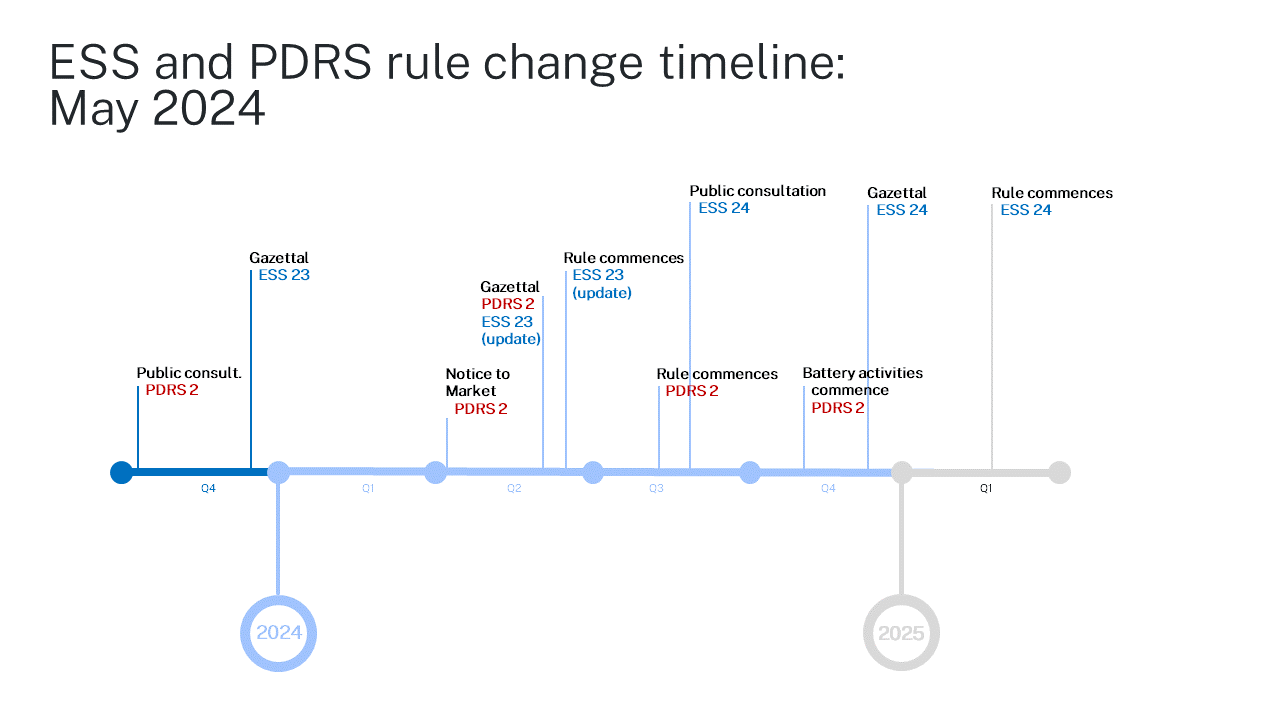Latest update
We've updated our planned changes as of 24 May 2024. Read more below.
Planned changes as of May 2024
Below are planned changes for each of the schemes until 2025. The dates are correct as of May 2024, and we will update them if timelines change or if we have new information.
In the figure below, ‘Gazettal’ is the Rule publication date and ‘Rule commences’ indicates the date that these changes come into effect.

Q4 2023: ESS 23 gazettal
24 May 2024: ESS 23 update gazettal
19 June 2024: ESS 23 update – rule commences
Q3 2024: ESS 24 public consultation commences
Q4 2024: ESS 24 gazettal
Q1 2025:ESS 24 changes effective
Q4 2023: PDRS 2 public consultation
April 2024: PDRS 2 Notice to Market
24 May 2024: PDRS 2 gazettal
1 August 2024: PDRS 2 rule commences
1 November 2024: PDRS 2 battery activities commence
Establishing the Safeguard
The Safeguard was established after we amended the NSW Electricity Supply Act 1995, as part of the second emergency COVID-19 response bill package, passed by NSW Parliament.
In September 2021, we released the Energy Security Safeguard position paper. It set out our final position on the design of the Energy Savings Scheme (ESS) and the Peak Demand Reduction Scheme (PDRS). This included reforms to the ESS, the new PDRS design and improvements to scheme administration. This paper also summarised stakeholder feedback in response to the Energy Security Target and Safeguard consultation paper.
In December 2021, we amended the Electricity Supply Act 1995 to include the Renewable Fuel Scheme, which was introduced in the NSW Hydrogen Strategy.
In October 2022, we amended the Electricity Supply (General) Regulation 2014 to implement reforms announced in the ESS position paper and to create regulations for the PDRS.
The Safeguard schemes
The Energy Security Safeguard (Safeguard) consists of the ESS, the PDRS and the Renewable Fuel Scheme (RFS).
Each of the 3 Safeguard schemes are certificate schemes that create financial incentives. This supports households, businesses and industry to change their energy use and encourage producers to create green hydrogen. The schemes will help our energy systems be more affordable, reliable and sustainable.
The ESS provides incentives to improve energy efficiency. The PDRS incentivises energy usage reduction during peak demand hours. The RFS will provide incentives from 2024 to produce green hydrogen.
The 3 schemes were established under the NSW Electricity Supply Act 1995. The Electricity Supply (General) Regulation 2014 details how the schemes work.
We review the schemes every 5 years to check they have met their objectives and make adjustments where needed. The next review of the Energy Savings Scheme and Peak Demand Reduction Scheme will begin in 2024 and will be published in 2025. The first review of the Renewable Fuel Scheme will be published in 2029.
We set out how certificates are created, how they can be accessed and what specific activities are included. This is done through the publication of a rule for each scheme.
The Rules are reviewed and updated annually, known as the rule change process, to ensure they stay relevant to the technical and market conditions in which they operate.
Rule change process
We start each rule change process by researching market conditions, new developments and technologies, and consulting with our stakeholders. This helps us decide what rule changes may need to be made to ensure the scheme remains relevant to the market conditions.
We then hold a public consultation explaining our proposed rule changes to ensure we engage with the wider NSW community.
The rule is finalised and published in the NSW Government Gazette after consultation. This means that the rule is now legislated and implemented. By including these processes, we can:
- incorporate stakeholder feedback and evaluation results
- make changes to rule requirements, such as adding new equipment standards
- add activity schedules for new technologies
- make enhancements that maintain rule integrity and/or reduce transaction costs
- improve harmonisation with other schemes.